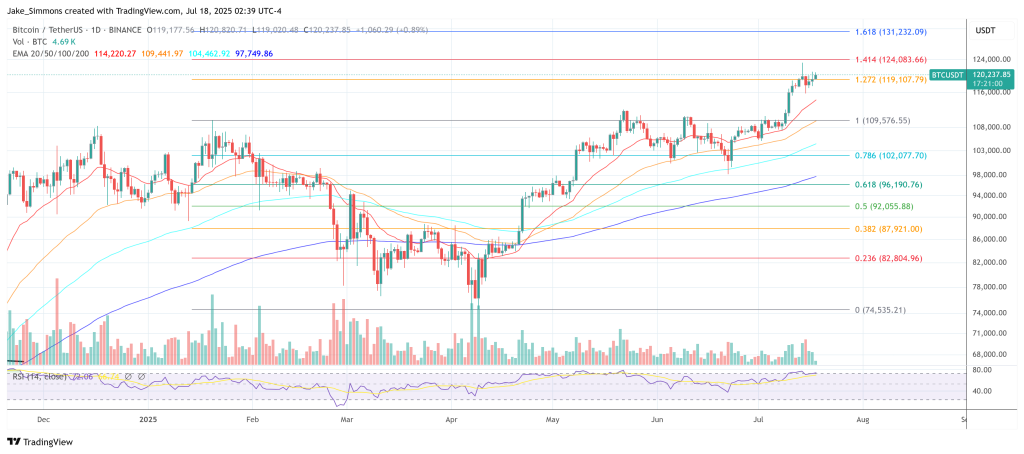
content, reviewed by leading industry experts and seasoned editors. Ad Disclosure
The Digital Assets Research Institute (DARI) has published the first quantitative study of Bitcoin’s role in humanitarian crises, concluding that the cryptocurrency has already helped an estimated 329,000 refugees safeguard, transport or rebuild their savings after fleeing conflict or persecution. The analysts warn that the figure is a floor, not a ceiling: if present adoption and displacement trends persist, between 6.5 million and 7.5 million refugees could be relying on Bitcoin by 2035, a ten-fold increase that would move the asset “from anecdote to infrastructure” in global relief dynamics.
Because on-the-ground surveys are often impossible in war zones or camps, DARI combined UNHCR country-level refugee data with TripleA’s 2024 crypto-ownership rates, then isolated Bitcoin users by applying a 65 percent share derived from Binance Research. To stay conservative, the team subtracted the roughly 22 percent of displaced people who remain in long-term camps without reliable internet or smartphones.
The remaining cohort—those who actually cross borders and reach connectivity—produced the 329,000 baseline. The model also assumes digital-asset ownership among refugees mirrors that of their home population, an assumption the authors describe as “erring on the side of understatement” because educated, mobile citizens are disproportionately represented among people able to flee.
Why Bitcoin, Not Stablecoins
DARI finds that refugees gravitate toward Bitcoin for the same properties that once made physical gold attractive: portability, censorship-resistance and independence from failing banks. By contrast, stablecoins such as USDC can be frozen by issuers and require intermediaries that often collapse in wartime. “There are no verified cases of refugees independently using stablecoins like USDC or Tether to escape conflict zones,” the report notes, adding that Bitcoin’s peer-to-peer architecture “gives it an edge as a grassroots tool for those fleeing authoritarian regimes and collapsing economies”.
The aggregate numbers are grounded in vivid case studies. During Russia’s invasion of Ukraine, a 20-year-old IT worker known as Fadey escaped to Poland with $2,000 in Bitcoin on a USB stick after ATMs capped withdrawals at the hryvnia equivalent of thirty-three dollars. “I couldn’t withdraw cash at all… the queues were so long, and I couldn’t wait that much time,” he told reporters; the cryptocurrency paid for food, lodging and onward travel, sparing his family a refugee-camp limbo.
In Gaza’s 2023 siege, taxi-driver Yusef Mahmoud crowdfunded more than 1.5 billion satoshis—about one Bitcoin at the time—to buy water, food and generator fuel for hundreds trapped behind the blockade. “We only have cash or Bitcoin,” he said after banks and payment apps collapsed.
Grass-roots experiments extend beyond war. After the 2021 Nyiragongo eruption displaced thousands in eastern Democratic Republic of Congo, local volunteers distributed QR-coded Bitcoin to families and persuaded merchants to accept it for soap, medicine and building materials, seeding a micro-economy where traditional aid channels had stalled.
Economic Shock-Absorber For Host Nations
DARI argues that refugees who arrive with even modest Bitcoin holdings integrate faster and require less public assistance. Field interviews suggest that crypto-enabled newcomers can rent accommodation, arrange transport and search for work without waiting for bureaucratic cash-aid programmes, relieving pressure on already-strained host budgets. “Refugees who carry Bitcoin can re-establish their lives more quickly,” the authors write, urging regulators to treat self-custodied wallets as personal property and to carve out humanitarian exemptions in anti-money-laundering rules.
With global displacement topping 117 million people and Bitcoin adoption still compounding at roughly twenty percent per year, the report calls on governments and NGOs to prepare for a world in which “a memorised twelve-word seed phrase may be the last vestige of a person’s economic identity”. Rather than viewing the cryptocurrency solely through the lens of illicit-finance risk, policymakers should recognise its emerging humanitarian function and support responsible, rights-preserving use, DARI says.
At press time, BTC traded at $120,237.
 BTC price, 1-day chart | Source: BTCUSDT on TradingView.com
BTC price, 1-day chart | Source: BTCUSDT on TradingView.comFeatured image created with DALL.E, chart from TradingView.com

Editorial Process for bitcoinist is centered on delivering thoroughly researched, accurate, and unbiased content. We uphold strict sourcing standards, and each page undergoes diligent review by our team of top technology experts and seasoned editors. This process ensures the integrity, relevance, and value of our content for our readers.

















 English (US) ·
English (US) ·